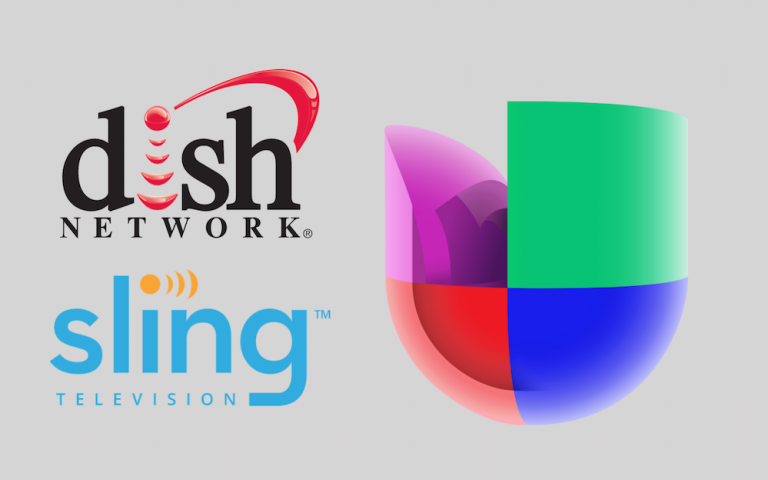Univision’s carriage dispute with DISH continues to escalate as the network blackout enters its second month and renewal talks between the companies are at an impasse.
Viewers have been unable to watch Univision programming on DISH and Sling TV since June 30.
To appease its customers, DISH has been offering to send its DishLATINO and Sling Latino subscribers free over-the-air antennas in eligible areas so they can see Univision and are offering an automatic $5 credit in August.
Univision was quick to jump on the satellite and OTT operator’s move, arguing “with this announced refund, Dish recognizes what its Hispanic customers already know to be true: without Univision networks and local stations, there is no “DishLATINO” and certainly no “Best of Spanish” on Sling TV. Given that our networks account for 60% of Spanish-language viewing on DishLATINO, their $5 refund is yet another example of Dish drastically undervaluing Univision and Spanish-language programming, as well as disregarding why Latino viewers have paid Dish for its services.”
But DISH, which has 13.1 million subscribers (including Sling TV) questions where Univision is getting its numbers, as it doesn’t even offer that type of audience breakdown.
The carrier contends it is providing replacement content and that DishLATINO offers more than 35 Spanish language news, entertainment and sports channels including Telemundo, ESPN Deportes, Fox Deportes, Azteca and Pasiones.
DISH insists Univision is demanding an excessive increase in retransmission fees, “despite reports showing the programmer lost more than 50 percent of its prime-time viewership in the last seven years,” offering its content free over the air and selling it online at $7.99 a month for Univision Now – a lower price “than what they propose charging DISH.”
Univision, meanwhile, is staying firm on its value proposition and claims it has submitted “a good-faith and meaningful offer,” but that DISH responded with an offer that was essentially the same as the one they previously offered back in June” and says it is “willing to negotiate with Dish at any time and ready to return to their offices this week should they choose to be constructive to the process.”

i think Univision have more to lose, than dish. Univision lost audience and they can’t keep asking if you don’t have what you sell. Plus Televisa content is not help that mush either
Univision has lost a lot of its audience Its programming and biased news reports do not help. Rather than increasing prices they should offer our latino community entertainment with values.
The obvious loser in this impass are the viewers. I’m a very cost conscience consumer, and the fact that SlingTV has quality programming at a reasonable price, is why my family continues to subscribe to their service. I understand SlingTV/Dish are efficient negotiators, and are looking to keep their subscription fees affordable. I miss the El Rey network, one of the few English language channels that were distrubuted by Univision. Other than the El Rey network, I can honestly say that I have never viewed any programming on any of the Univision distributed networks. I can also that I never watch any Sports programming, other than the Olympics.
I don’t wish to deprive viewers of this programming, and accept that the $25 a month fee for SlingTV Blue is reasonable for the variety and quality of programming my family receives. But if my monthly fees need to be increased by a considerable amount to provide programming that I not only wouldn’t watch, but in the case of most Univision programming, wouldn’t understand because it is not in English, then we would most likely cancel our subscription.
I suggest Univision consider just agreeing to have their networks be included as an add-on Service, like HBO, Showtime, etc for customers who wish to pay $7.99 extra per month, (which is what their stand alone app subscription cost is), rather than increase the rate for all customers by more than $10, to $35, and including it in the base package.
My understanding is that Univision was attempting to use the situation with family separation at the border, and immigration issues in general, to demand more than triple what other broadcast networks, like NBC, and FOX receive to re-broadcast their programming to their subscribers.